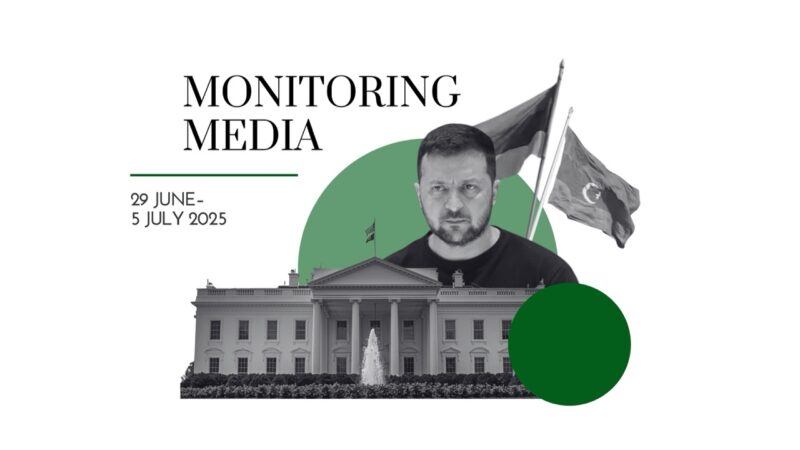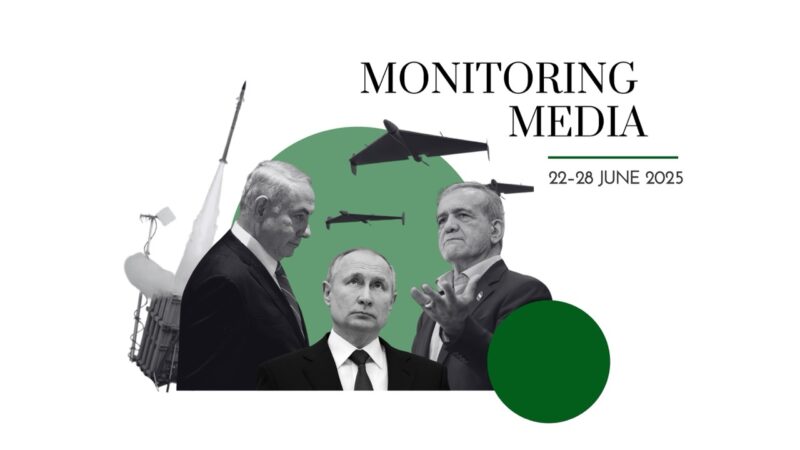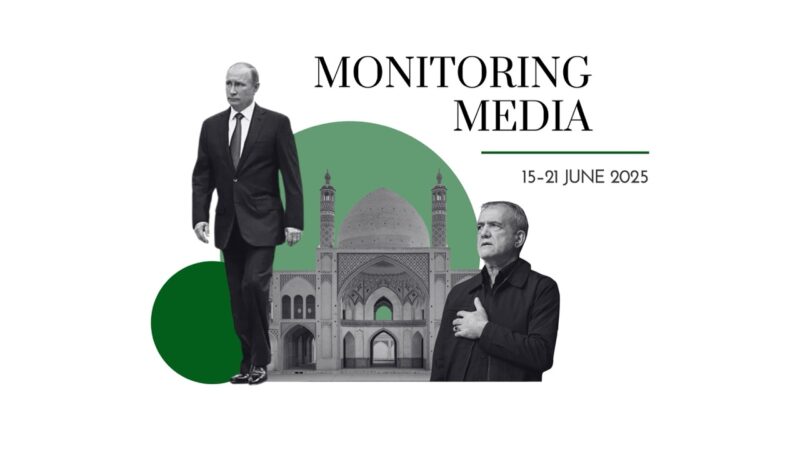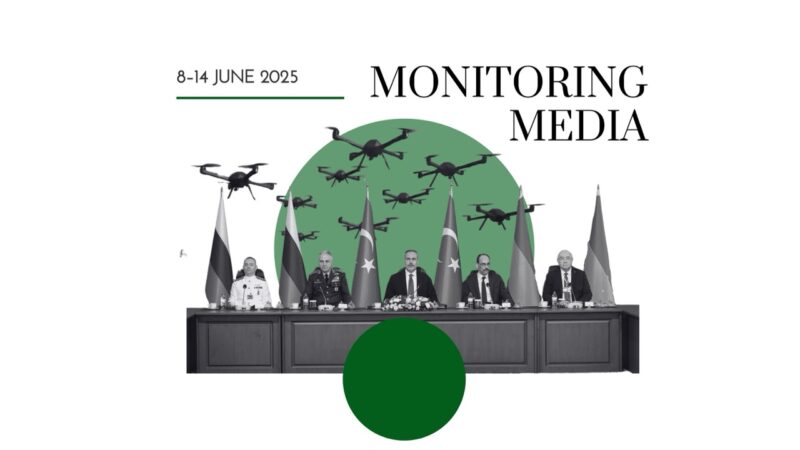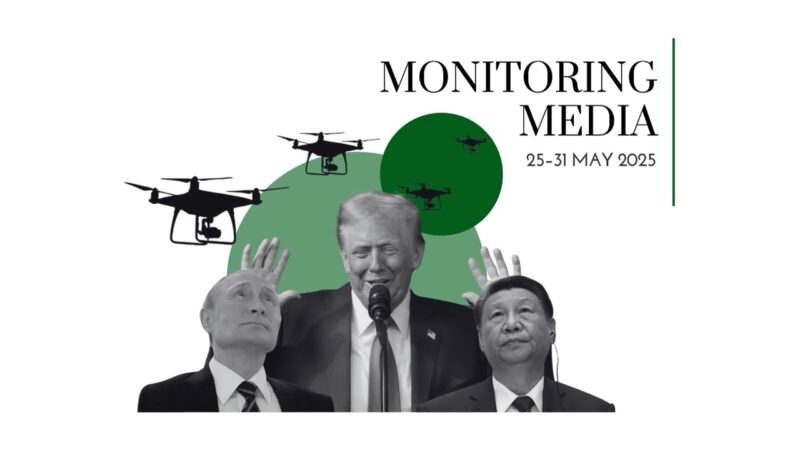Russia must pay for the war against Ukraine

CIUS weekly report on North American media coverage of Ukrainian affairs, 25 February–2 March 2024
Six publications (Politico, Foreign Policy, The National Interest, Wall Street Journal, The Globe and Mail, and Edmonton Journal) were selected to prepare this report on how Ukraine has been portrayed in the North American press during the past week. The sample was compiled based on their impact on public opinion as well as on their professional reputation, popularity among the readership, and topical relevance. These publications represent centrist viewpoints on the political spectrum.
This MMS report covers only the most-read and relevant articles about Ukraine, as ranked by the respective North American publications themselves in the past week. Its scope covers promoted articles on home pages and articles from special sections on Ukraine, with the hashtag #Ukraine, from the paper editions of the publications, and about Ukraine from opinion columns and editorials.
Topics featured in the selected articles:
- The world and Ukraine: backbenchers in Congress are trying to save Ukraine; President Macron floats idea on Alliance troops in Ukraine; Canadian province of Alberta signals readiness to help Ukraine’s energy sector;
- Russia at war: Russia can menace from space; Russia must pay for its war against Ukraine;
MMS summaries:
US backbenchers trying to save Ukraine. The editorial board of the Wall Street Journal reflects on an alternative bill by a bipartisan group of US Congress representatives that would provide assistance to Ukraine. This bill could unblock the Congress, as it combines border security and weapons for allies, including Ukraine. Given that the draft law is a compromise, the amount of US support for Ukraine is affected: “The bill includes roughly $47 billion for Ukraine priorities, down from about $60 billion in the bill that passed the Senate this month. The House lawmakers excluded the Senate’s $7.8 billion in government budget aid to Kyiv, which Ukraine’s critics portray as paying salaries for bureaucrats.” The draft law also excludes other important components that would contribute to Ukraine’s ability to defend itself against Russian aggression: (1) a mechanism for the rapid provision of US weapons to Ukraine; and (2) “billions in loans and grants for Ukraine, Israel and Pacific partners to purchase U.S. military equipment.” However, this House bill is a better solution than nothing, which would doom Ukraine to defeat. According to the authors, “The Ukraine vote is shaping up as the most consequential for U.S. interests and the defense of Europe since the decision to deploy intermediate-range nuclear missiles in the 1980s. Mr. Johnson and House leaders owe the Members the chance to vote their conscience rather than using a procedural blockade.”
What is Russia’s threat from space? Todd Harrison and Clayton Swope (National Interest) emphasize that the Russian threat from space is real, but it should not be overestimated. Due to the lack of information in the public domain, two main theories have emerged regarding this possible threat: “it is [either] a nuclear weapon in space or a nuclear-powered electronic warfare satellite.” Paradoxically, it is the second option that causes the most concern. Space-based nuclear weapons designed to harm satellites will not change the status quo. The use of such weapons against opponents’ satellites is a “kamikaze attack in space because it would likely take out many of Russia’s own satellites along with whichever systems it would be targeting and the satellites of many other nations.” According to the authors, this “would be an act of desperation—much like Russia’s repeated threats to use tactical nuclear weapons in Ukraine.” The other hypothesis, which involves the use of a nuclear-powered electronic warfare satellite against other satellites, is more threatening: “Equipping a satellite with a nuclear reactor and an electronic warfare payload could allow Russia to jam the signals between satellites and Earth or the crosslinks between satellites.” This could create significant difficulties for Kyiv, which does not have anti-satellite missiles to counter this threat. According to Harrison and Swope, “This is a weapon that we should be concerned about because it’s one that Russia could use without crossing any nuclear red lines and which would provide Russia an immediate battlefield advantage.”
Russia must pay for the war against Ukraine. Edward Fishman and Kevin Brunelli (Politico) declare that Washington must accept the risks and tighten the screws on Moscow. According to the authors, Washington’s latest package of sanctions simultaneously demonstrates a desire to ensure compliance with the sanctions already imposed and, on the other hand, an unwillingness to push through “penalties that would sequester Russia’s oil revenues or secondary sanctions that would fully isolate Russia from the global financial system.” Under these conditions, Ukraine is left without aid, which is stuck in Congress, and without an effective system of sanctions that would force Russia to stop the violence. The dual nature of Western sanctions has allowed Moscow to minimize the consequences of their implementation: Russia has created a “‘shadow fleet’ of oil tankers, estimated at anywhere from 600 to more than 1,000 vessels”, reduced its dependence on Western maritime insurance, and found third countries willing to help it circumvent sanctions. Another problem is the ineffectiveness of restrictions on the export of semiconductors and other technologies for the Russian military: “By some estimates, Russia was able to import more than $1 billion of advanced semiconductor chips made by American or European companies last year in spite of the restrictions.” According to Fishman and Brunelli, in order to suppress the Russian military-industrial complex, Washington should impose secondary sanctions on foreign banks that enable Russia to pay for imports with technology, and on firms based in allied countries that sell technology to Moscow. “Policymakers often reach for sanctions because they seem to provide a low-risk alternative to military force. In the economic war against Russia, the West has bumped up against the limit of the pressure it can bring to bear without incurring both economic and diplomatic risk. But standing up for freedom requires risk. And there are important steps President Biden can take now where the risk is not so high as to overshadow the large potential benefits.”
What did Macron mean about troops in Ukraine? Daniel B. Baer and Sophia Besch (Foreign Policy) suggest that French president Emmanuel Macron’s statement that some European countries could send their troops to Ukraine may have more goals than meets the eye. First, it may be that Paris wants to try to fill the political leadership vacuum in Europe created by the US elections and restore the European security system: “Keeping future options open—and Putin guessing—could be a way to signal to the Kremlin that Europe is taking deterrence seriously.” Second, Macron may have been trying to move the debate on support for Ukraine forward: “In his comments, he bemoaned some countries’ tendency to initially reject most proposals for Ukrainian support before eventually acquiescing.” Third, with such an unexpected statement, Macron may have wanted to divert the attention of the European community from France’s prior passivity in helping Ukraine: “According to the Kiel Institute for the World Economy’s Ukraine Support Tracker, France ranks 22nd among the EU’s 27 members in terms of aid commitments to Ukraine as a share of GDP. Whereas Germany this month committed another 7.1 billion euros ($7.7 billion) to Ukraine, a recent bilateral security agreement between France and Ukraine promises French military assistance of only “up to” 3 billion euros—which puts France in the range of much smaller European countries, such as the Netherlands with its pledge of more than 2 billion euros.” All three options could serve as a deterrent to Russia, but they cannot help Ukraine now. According to Baer and Besch, “If France wants to lead on European security, it should focus less on trial-ballooning the idea of troops on the ground and more on working with the existing Ukraine Defense Contact Group to send more military support to Ukraine, including French weapons and materiel. Before it’s too late.”
What Ukraine, West should expect following the invasion. Timothy Garton Ash (Globe and Mail) reflects on the end of the post–Iron Curtain period, marked by Russia’s invasion of Ukraine, and posits the emergence of what he calls a potential “post-Western world.” The author contends that amidst the war in Ukraine, many global powers are not aligning with the West against Russia, highlighting a shift away from its initial dominance. Garton Ash suggests that a new era is dawning, characterized by shifting alliances and a shared resentment of Western supremacy among various global powers. Moreover, he warns of the possibility of escalating conflict, drawing parallels to pre–World War II tensions. Garton Ash stresses the importance of currently pending decisions, asserting that they will shape the global landscape for decades to come and urging for lessons to be learned from history: “The gamble of civilization is that we can learn from the errors and horrors of the past without having to go through them all again ourselves.”
Alberta signals readiness to support Ukraine’s recovery from Russia’s invasion. Jackie Carmichael (Edmonton Journal) reports on a memorandum of understanding between Alberta’s and Ukraine’s ministries of energy that is aimed at aiding Ukraine’s energy sector recovery from the impacts of Russia’s invasion. Alberta is pledging advisory and physical support for the reconstruction of Ukrainian energy infrastructure, recognizing its most urgent needs. The partnership has identified potential areas such as exploring new energy sources, hydrocarbon development, electricity, energy efficiency, and technology development. It is guided by the parameters of a 1994 agreement between Canada and Ukraine, emphasizing the importance of promoting private business and fostering economic cooperation. At the moment, there are no costs associated with the MOU, according to Alberta officials, as the document represents “an agreement in principle to work together.”
NATO dilemma regarding the global threat posed by Russia. Franz-Stefan Gady (Foreign Policy) highlights the increasing concern in Europe concerning the potential for a Russian attack on EU member states, particularly if Ukraine loses the ongoing war. Various European leaders and military officials have issued warnings about the possibility of further Russian aggression and have urged preparations for potential escalation in the wider region. NATO’s primary focus remains defending the Baltic countries, which border Russia, with war planners envisioning scenarios that involve conventional, nuclear, and hybrid warfare tactics. Gady highlights the complexity of the alliance’s planning, due to differing threat perceptions among NATO members and lack of clarity surrounding Russia’s military capabilities and intentions. “But all these exhortations to get ready for a potential war with Russia beg the question: What, exactly, is Russia preparing for? And what, in turn, does Europe need to do to be ready for various contingencies?” the author stresses. War planners within the alliance contemplate multiple scenarios: Russia might opt for a full-scale invasion of the Baltics, or it could pursue a strategy of occupying smaller portions of territory to challenge and undermine NATO’s resolve in defending a smaller frontier state against a nuclear-armed Russia. Complicating strategic planning, Russian tactics could involve a combination of conventional assaults, nuclear intimidation to dissuade NATO intervention, and unconventional methods such as cyberattacks, disinformation campaigns, and sabotage across various NATO members, particularly aiming to erode alliance cohesion. At the same time, meeting the demands of hybrid warfare presents distinct challenges compared to countering large-scale military offensives on NATO territory. Both forms of aggression are of paramount concern for the Baltic states and Poland, although nations farther away from Russia also express greater apprehension about hybrid tactics than a direct invasion, according to the author. Berlin’s emphasis on addressing hybrid threats could account for the sluggish progress in rebuilding Germany’s conventional military capabilities. Even two years after Russia’s full-scale invasion of Ukraine, Germany faces hurdles in deploying a fully operational brigade to Lithuania by the projected deadline of 2027.
